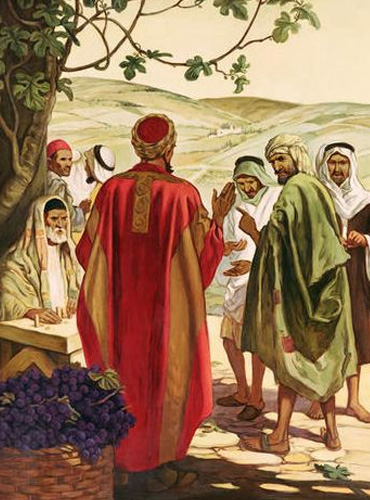Wednesday of the Twentieth Week in Ordinary Time – Mt 20:1-16
Today’s Gospel presents us with the parable of the workers in the vineyard. Although the scene might seem somewhat foreign to us, to His listeners, Jesus’ parable expressed a very common reality. Towards the end of September, the grapes were ready for harvesting, and the harvest had to be done quickly, because the coming rains would ruin the crop. Hence, there was always a need for extra hands to harvest, and those extra hands would come from the daily laborers who would wait in the market, awaiting hire. The usual pay for a daily laborer wasn’t much at all, and, for a father of a family with a wife and children to provide for, a day without work meant a day without food.
It is against this background that we see two characteristics of God: first, His compassion, and, second, His generosity. First, we see God’s compassion in that even the men standing around idle at the end of the day are sent into the vineyard. Given that the Jewish day ended at 6 pm, it doesn’t make sense, at least humanly speaking, for the men to work an hour. However, the owner summons even these workers to help. In this, we see that it is part of man’s dignity that he work and in this way participate in the works of God. There is a very real sense in which laziness or a lack of things to do to help others go against man’s dignity. God puts everyone to work and to use; although their labors might not seem like much to them or to others, nonetheless God wants them to cooperate with Him in His labors.
Secondly, we see God’s generosity. Indeed, this is the point that the owner makes at the end: “Am I not free to do as I wish with my own money? Are you envious because I am generous?” Yes, strictly speaking, those who worked less, in justice, should receive less. However, God is generous. The owner knew that his workers needed those wages to survive, and so he gave them a full day’s worth of wages for an hour of work. Notice that the first group made a contract with the owner: “After agreeing with them for the usual daily wage, he sent them into his vineyard.” For the later groups, there is no contract. They are simply sent to work and told the pay will be forthcoming.
So, what does all of this mean for us? On one hand, we’re reminded that God puts everyone to work in His kingdom. We all need to help spread the Gospel and bring others to Christ. Some of us come later, and some of us began sooner in life, but the timing doesn’t matter. Those who have been practicing their faith longer, or entered religious life earlier, can’t say, “Well, I’ve done enough,” nor can they look down on those who came later. God calls each of us to work.
Likewise, we must also be generous in our service. The first group made a contract with the owner, and received the just reward. However, it is clear they were working just for the money, and became angry with the owner. In our lives, too, we can run the risk of losing sight of the fact that all of our apostolates, works, prayers, etc., are all meant, first, to help us become saints and, second, to bring others to God. That is what really matters. We have faith that God will reward us, and that knowledge is enough. Being with God and serving Him must be our goal, and not simply the “heavenly paycheck,” as it were. As Saint Bernard once asked his monks, “What do you seek, the consolations of God, or the God of all consolations?” Do we seek the rewards, good feelings, temporal benefits of serving God, or do we seek God?
Today, let us ask, through the intercession of Mary, Queen of Heaven and Earth, to serve God as He deserves to be served.






